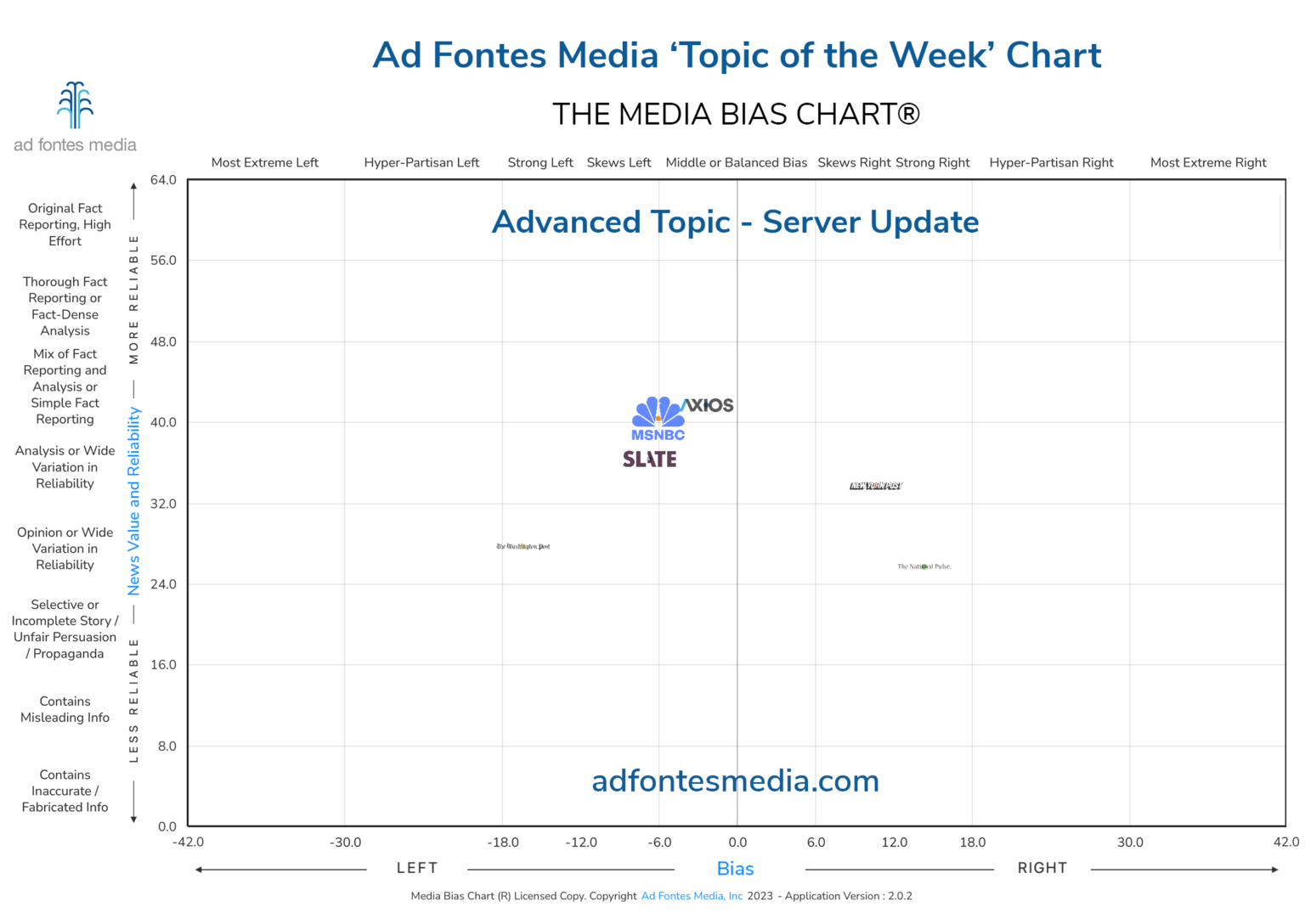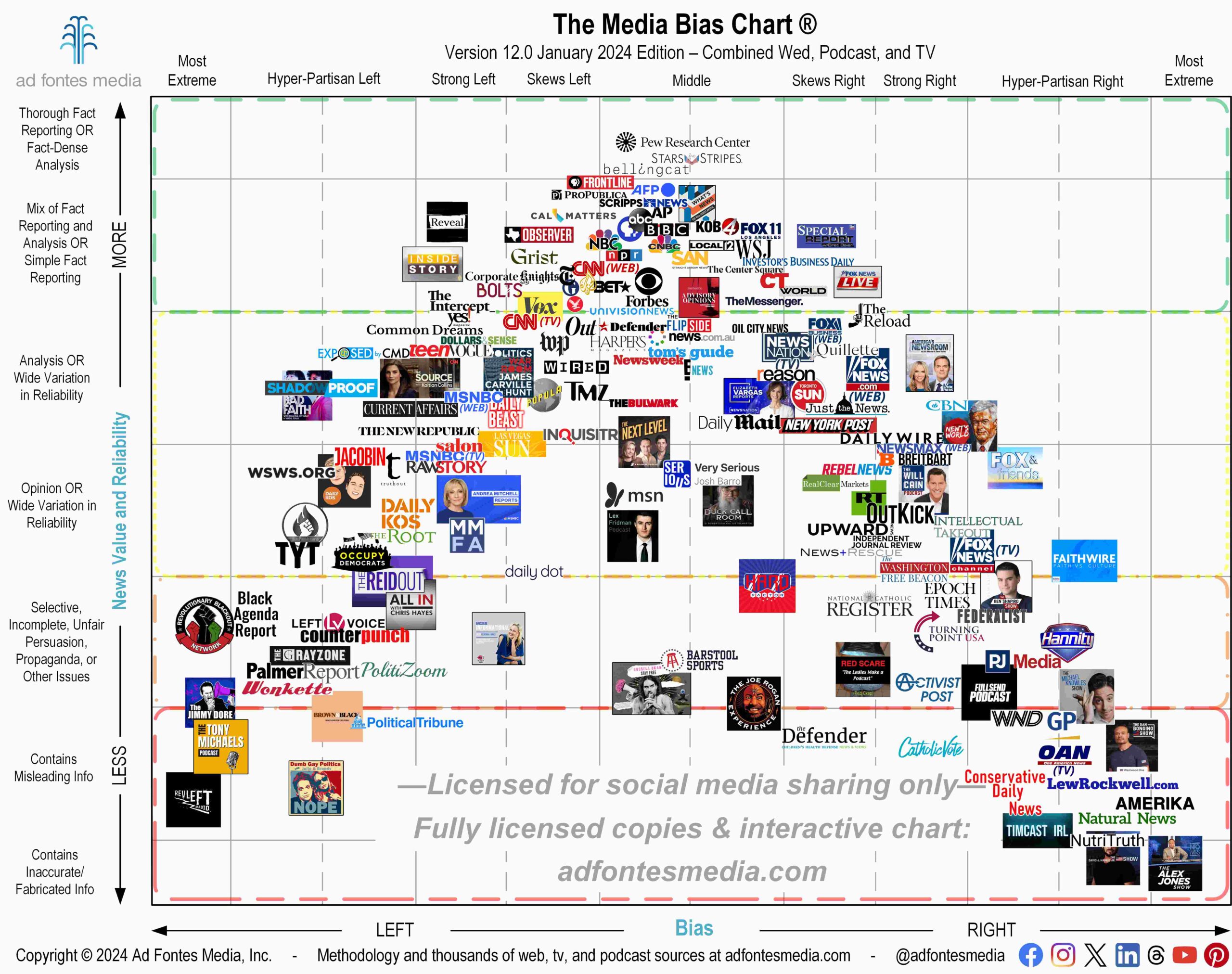Menu

Determining Media Bias in Articles Covering Trump’s Mar-A-Lago Classified Documents Case
Ad Fontes Media explains the bias and reliability ratings for this week’s Advanced Topic of the Week.
Author:
Sara Webb
Date:
08/08/2023
Each week, Ad Fontes Media chooses a widely-covered trending news topic to share insight into how our analysts rank news coverage for the Media Bias Chart®. For this installment, our analysts took a deep dive into the breaking story of a named third defendant and additional charges levied against former President Donald Trump in the case of the classified documents found at his Mar-A-Lago property in Florida. New evidence suggests a deliberate cover-up.
To create our Topic of the Week, we select six articles reporting on the same story from different outlets to show how each treated the topic. Once we choose a set of articles, pods of analysts with diverse political perspectives (one right-leaning, one center, and one left-leaning) read each article and discuss them using Ad Fontes Media’s content analysis methodology to determine their bias and reliability. These scores are combined to form the ratings that inform the articles’ placement on that week’s special Media Bias Chart.
The articles that our analysts rated as having middle or balanced bias (between -6 and +6 on the Media Bias Chart) of the Mar-A-Lago classified documents story include coverage from MSNBC, Axios, and Slate. The articles that our analysts found to be more biased came from The Washington Post, The New York Post, and The National Pulse.
The Washington Post article, “New indictment Proves Trump Never Learned the First Lesson of Watergate,” is an opinion piece written by former Post deputy national editor and Pulitzer Prize finalist Ruth Marcus. Our analysts gave it a strong left lean at a -16 (on a scale of 42 to -42), and a reliability rating of 27 (on a scale of 0 to 64). Specifically, this story falls in the range of opinion or fair persuasion, or in other words, an opinion piece that is not posing as something factual. Our analysts saw this in particular when rating for bias: “If the allegations in the latest indictment of Donald Trump hold up, the former president is a common criminal — and an uncommonly stupid one.” The use of the pejorative “stupid” here accounts in part for lowering the reliability score.
The New York Post article, “Republicans in frenzy over timing of ‘brazen’ new charges against Trump: ‘We cannot allow this to stand’,” was written by Richard Pollina, who is a frequent writer for the news outlet. Our analysts rated this at a 10 for bias, which is right leaning but just outside of that balanced -6 to 6 range. They also rated it at a 33 for reliability, which places it in a higher bracket than the story above, although barely, as analysis/opinion. Our analysts noted that the story repeated many of the talking points already seen in this saga but offered little by way of analysis: “‘This is prosecutorial misconduct used at a level never seen before,’ Trump told Fox News on Thursday,” and “If I weren’t leading Biden by a lot in numerous polls, and wasn’t going to be the Republican nominee, it wouldn’t be happening. It wouldn’t be happening.”
The third, more biased story, ”Biden Prosecutor Adds 3 More Charges to Trump Documents Case,” is from The National Pulse, a right-leaning news organization affiliated with Steve Bannon and written by an unnamed staff writer, attributing the authorship to the whole publication instead of one particular person. Our analysts scored it at a 14 for bias, making it moderately right leaning, and a 25 for reliability, which puts it at the bottom of the opinion and fair persuasion bracket. It is also the shortest of all of the articles at just three paragraphs in length. Short length usually indicates either a clipped, factual story, or like the one we have here, just enough of a story to potentially influence readers to think a certain way. Our analysts noted that the article is “not far right in outlook, but hyper-partisan in rationale (‘Joe Biden’s foreign-dwelling, Obama-linked prosecutor “Jack” Smith has added three more charges against former President Trump’)” and also that it is “highly selective, propagandist” in its writing.
It is always interesting to see how six different sources present the same story — what they focus on, what details they hone in on or omit entirely, and if they have a named author. If you’re interested in learning more about how we rate the news or our resources for educators, check out our website.
As usual, we divide our rated stories into two packages for educators: a Starter package, for a less experienced or younger audience, and an Advanced package, for a more experienced audience.
Be sure to check in next week for another exciting episode of… Topic of the Week!


